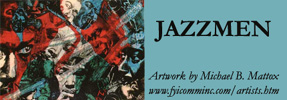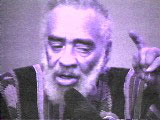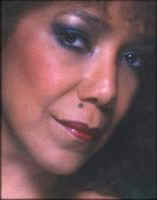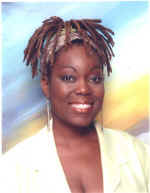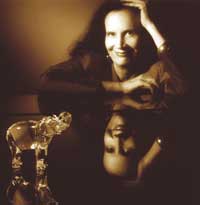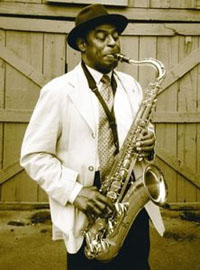Archie Shepp on music and revolution in the 60s
"The times were quite different. This music was, in a sense, right in tune with the whole revolution and the speeches of Martin Luther King and the Black Panthers, the black Muslims, we were right in tune with all of that. We weren't making any money, but I mean, we played at lofts for five dollars a night. Dennis Charles and Don Cherry and whatever money we made, we split up and would give it to our political organizations. ... because we were in struggle at that time. We would give money to our political organizations to press leaflets. We would go up to Harlem. We would support whatever was going on at the time, Urban League, the more radical Black Panthers, whatever. I played concerts, gigs, spoke on the streets."
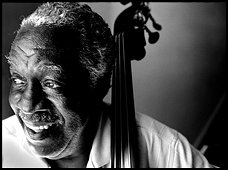
KETTER BETTS
OSCAR BROWN, JR.

 NELSON
HARRISON
NELSON
HARRISON
ARTHUR
HARPER

MICKEY ROKER

CAROLYN MCCLENDON, PHILLY JOE JONES, TRUDI PITTS
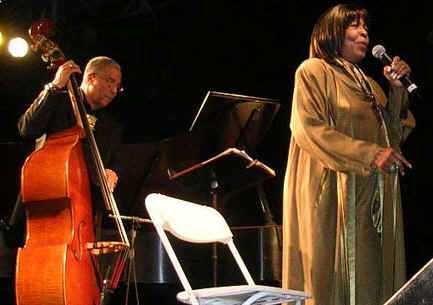
GLORIA LYNNE

ELLA FITZGERALD
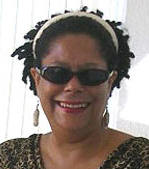
DIVA JOAN CARTWRIGHT
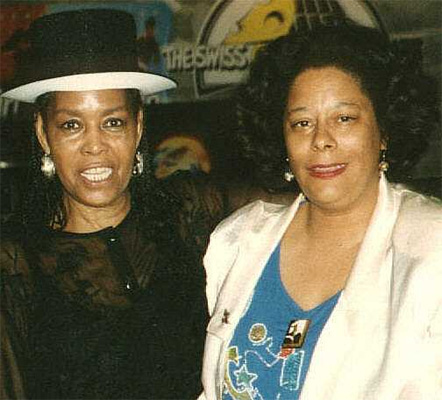
ABBEY LINCOLN AND JOAN CARTWRIGHT
RITA GRAHAM - JUS' CYNTHIA
JOANNE BRACKEEN
"There is only Black American Jazz...all others are weak imitations of the original." -- ARCHIE SHEPP
Shepp came to prominence as an articulate and passionate critic of the economic exploitation and cultural suppression of the African-American artist. (Source)
A Fireside
Chat with Archie Shepp
Posted: 2004-02-21
By Fred
Jung
I have read Archie Shepp described as “radical,” “controversial,” or
“disturbing.” Why? What is so “disturbing” about speaking your mind about
subjects beyond the music? And why should writers even be focusing on
Shepp's political views anyway? He is first and foremost an artist and as
one, we should judge him by his discography, not his politics. I have always
been challenged by the tenor, who was immortalized in the 1965 Newport Jazz
Festival concert recording, New Thing at Newport. I was honored that Shepp
took time away from his busy schedule to sit down with the Roadshow the day
after he returned from Europe. I bring it to our babies, as always, unedited
and in his own words.
All About Jazz (AAJ): Let's start from the beginning.
ARCHIE SHEPP (AS): Well, my father, he was a banjo player and he liked to
sing. There was music all around me. My community was rich with music and
from that point of view, my cup runith over. It was inspiration for me. That
was the one thing that poor black people had was music and a musical
environment. It was a very rich musical environment and a very original one.
AAJ: Why did you put down the banjo?
AS: Well, you know, Fred, it wasn't hip. I guess when I got to Philly, I was
born in Florida, in the South, where things are much more bucolic and rural,
but as I moved to the North, the guys were playing pianos and saxophones and
basses and I began to see other things and hear other things. It is your
personality as well. I guess I wanted to some degree to be out front. Since
then, I have found out that basically, I make as much money as a saxophone
player as I would have being in the back (laughing). When we moved to
Philadelphia, I started formally on piano. My parents were poor, but music
lessons were not really very expensive because, here again, Philadelphia is
so rich, like many of the cities, Detroit and Chicago, there were always
black people and instructors who had graduated with degrees and Ph.D.s and
couldn't find a job in music and symphony orchestras because of the racism.
So they ended up teaching kids in the park in their neighborhood for a
dollar a lesson, two dollars a lesson. That is how I studied.
AAJ: It is difficult for the current generation to relate to the struggles
of the Civil Rights Movement.
AS: The question that I would ask, Fred, is why aren't they familiar with it
because I don't think things have changed profoundly much. You might say
that there is a black middle class that has become less and less observant
of its own community and its responsibility to that community, but that
doesn't mean that the problems have disappeared. I see more and more
homeless people on the streets. I see my people struggling harder than ever.
I think the facade has changed. Cities are being gentrified. Fortunately,
thank God, I am living in a nice home, but I know a lot of my people don't
enjoy those opportunities.
AAJ: Whereas the racism during the Civil Rights Movement was blatant, the
underlying prejudices in this country now are more subtle.
AS: Oh, yeah, you might say that. But in Los Angeles, they had Watts there
in the Sixties and Rodney King, why wouldn't black people and people of
color be really hypersensitive, oversensitive? I could say what it was for
me. As you say, Fred, it was more in our face, but not so much even that.
Look at what happened in Brooklyn. The guy was shot by the police, this
Haitian guy (Amadou Diallo) raised his hands up to say that he was cool and
he was shot forty times. There are atrocious, really terrible things going
on in the world today that unfortunately, young people are blind to these
things. I think you have a generation of young black people who are totally
incognizant of the struggle that went on to put them where they are. For
example, I saw an interview with Wynton Marsalis in New Orleans with all his
buddies and homies and he was saying, “Growing up for me was like apple
pie.” That is typical of young kids today. He is not a young kid, but that
is typical of young men of his generation. Things were provided for them
that people paid a lot of dues for in the Sixties to create. I've been
watching some of the old films of Dr. Martin Luther King, especially for the
tone of his speeches and the language, which I find more and more inspiring.
I can go to it as a resource for my own soul, to answer things for myself. I
think of the immensity and the enormity of that struggle and the depth of
that struggle and what it did for young people today. I am amazed,
especially by black people, of their ignorance of their own time, of their
own recent time, their total insensitivity to the dues that were paid by the
people to create the changes that we see today.
AAJ: Influences?
AS: When I first started out, I guess I listened to a lot of blues and my
pop always had Duke on the record player, Count Basie's “Royal Garden
Blues.” We had quite a collection, even guys like Artie Shaw and Benny
Goodman. My dad played all that stuff on the radio. Then he played all the
folksongs. I really had a good background. The music of that time, which was
coming out of the swing era, was my initial exposure. Around the early
Fifties, a friend of my father's rented a room out in my father's house and
he introduced me to Sonny Stitt and Lester Young and that is how I first got
into this music. I had the good fortune to meet Lee Morgan when I was about
sixteen and he was really quite a big help to me. He was really a prodigy.
When I met him, he only had been playing about a year and a half. He was
already playing the first chair in the All Philadelphia High School
Orchestra. He transposed and sight-read excellently. He had a very good
knowledge of harmony, chord changes, which he himself probably learned from
his mentors. By the time I met him, he was already a very advanced musician.
He helped me in many ways. I started out taking piano lessons until I was
ten years old. On Saturdays, I used to go to Lee's house and he would
practice all day, especially Saturdays. He had this book, this trumpet book,
which they call the Bible for trumpet players and by the time he was
fifteen, he had played that book back to front every Saturday. That is what
he used to do. He needed a piano player to play simple changes for him while
he went through his “jazz reparatory.” I would comp for him and that is how
I learned how to comp on the piano, really just playing chords straight up
for him in the background while he played.
AAJ: That seems like it was a proactive time, does it concern you that the
time we are living in now is so passive in comparison?
“[John Coltrane] is a man that has profoundly affected me and my life. When
I have musical problems, I often go to Trane and he helps me.”
AS: That too of course, but I think that there is something behind all that.
All that had to happen anyway with the evolution of African-Americans
society as blacks become more and more integrated into the white middle
class experience. They begin to shed all their former community reference
and values. I also tell my classes that black people are becoming whiter and
white people are becoming blacker. Most of the kids in my class who are
really hip are white. It is a fact. If I got a class of sixty students let's
say and I asked how many of them have heard of Sidney Bechet and maybe five
people would raise their hands and invariably four out of five, if not five
out of five are white because I know no black kids know who Sidney Bechet
is. It is not in their background. He knows who Mozart is. He knows who
Beethoven is. That is why he is in school in university, to find out about
who somebody else is and not about who he is or she is.
AAJ: Let's touch on your collaborations with Cecil Taylor.
AS: Yeah, I joined his band in 1960. Here again, Fred, the times were quite
different. This music was, in a sense, right in tune with the whole
revolution and the speeches of Martin Luther King and the Black Panthers,
the black Muslims, we were right in tune with all of that. We weren't making
any money, but I mean, we played at lofts for five dollars a night. Dennis
Charles and Don Cherry and whatever money we made, we split up and would
give it to our political organizations.
AAJ: That kind of loyal dedication is so sadly missing these days.
AS: Well, because we were in struggle at that time. We would give money to
our political organizations to press leaflets. We would go up to Harlem. We
would support whatever was going on at the time, Urban League, the more
radical Black Panthers, whatever. I played concerts, gigs, spoke on the
streets. I was engaged. You don't find that these days, but why would you? I
think the world has been made more comfortable. It is the world of Oprah
Winfreys today. She is the model for black women, in the sense that she is a
billionaire. I don't think she does much. She is typical. There is nothing
against Ms. Winfrey. She is a very talented and a beautiful woman, but I
don't think she is very effective even though she is rich. That is typical
of our people today with young billionaires and all these musicians and
Michael Jordan and Shaq. What is the name of that singer? She is quite
beautiful. She has had some problems recently.
AAJ: Whitney Houston.
AS: Whitney, yeah. I think they form a class of people today that for young
black people, they are set up by the establishment to be seen as models, but
in fact, these are really hollow men and hollow women. They are people
without any clue of their own political history or historical knowledge of
where they come from, even their understanding of their own culture and what
they produce and its meaning to other things that are produced within their
own culture and so called jazz music. They don't see any relationships and
they don't make any relationships. The people who should really be
controlling jazz today should be Whitney Houston and Michael Jackson and
these people. They should be putting their money into that kind of
production. Of course, jazz doesn't make any money, but they could use it as
a tax write off. White folks do. The problem with the Negro is that I think
is that basically we still haven't recovered from our slave mentality. Look
at all this music made by black people. It is a thirteen billion dollar
industry and there is not a single jazz club of any stature owned by a black
man or woman in the United States. If you know one, tell me.
AAJ: Damn, and I wanted to be original.
AS: If you did know one, that would be doing pretty good. If you could count
them on your fingers, that would be doing all right. Not a single trombone
is made by a black man. Not a saxophone is manufactured by a black man. We
have no companies to make musical instruments. Why not? Italians are known
for eating spaghetti. They also make it.
AAJ: Let's talk about your work with the late John Coltrane. You appear on
his seminal Ascension recording.
AS: I can say for me, that he is a man that has profoundly affected me and
my life. When I have musical problems, I often go to Trane and he helps me.
I couldn't say enough about the man.
AAJ: Sounds like you miss him.
AS: Of course. I can go to him as a source of resource. He was always there
and he is still there. I do.
AAJ: You had a long association with the Impulse! label and in recent years
the label has been re-releasing a lot of your titles. Do you get royalties
from those reissues?
AS: Well, some things I get paid for, some things I don't. In fact, the
longer I stayed with the company. I began to learn how to protect my own
work. So I eventually formed my own publishing company. So those things that
I recorded as we went on, from Attica Blues, from the time of “Mama Too
Tight”, at that point, I began to put more things into my own publishing
company and so on. So to that degree, I do receive some receipts. I wasn't
hip enough at that time to sign artist royalty contracts, which is what
makes the difference. It means that when they re-release these things, you
get money from the releases as well. Now, I get money from the publishing
end or the writer's end, but no artist royalties, which could now really
account for something.
AAJ: The adjective that has been most closely associated with your music has
been avant-garde. Does the term have merit?
AS: Well, I have never accepted that term. I have always seen it as
divisive, commercial. It is like jazz, funk, disco. There are so many ways
to describe a black man and the black people's music. When we talk about the
white folk's music, we think romantic, baroque, classical. Those names mean
something. We think music. But with the negro, we think bebop, blues,
blah-blah-blah, blah-blah-blah. I wonder if people like Whitney and these
people have ever thought about giving their own music a name themselves.
Something that white people didn't give to it. Like what Monk said. Monk
said, back there in the Fifties, someone asked him why create bebop and he
said, “Well, we were trying to make a new music that the white boys couldn't
cop.”
AAJ: So name your own music.
AS: Music. Why not? What is so hard about the word music? People know what
it means. You say jazz and nobody knows what that means. What does jazz
mean?
AAJ: I don't have a dictionary in front of me.
AS: I know. It is the music that was created in 1917, a music for brass and
woodwind instruments meant to imitate the blues and the spirituals that have
previously been sung and played on banjos and guitars. So jazz is an
instrumental music. For example, Ella Fitzgerald is a jazz singer, but why?
Because she sings like an instrument. Billie Holiday is a jazz singer. But
she is often compared with Lester Young. The thing about jazz is that it was
the time of Negroes. Before that there was slavery and black people couldn't
afford trombones and saxophones and clarinets and those instruments. After
1917, some people say that about the end of the Spanish American War, 1890s
or something like that, the United States Marine Band began to put huge
number of instruments on pawn in pawn shops around the country, especially
around the mid-Southwest, where a lot of these early Negro brass bands
developed, Tennessee, St. Louis, Louisiana, those areas. So that is jazz.
There is nothing mysterious about it. It was when Negroes began to play
brass
and woodwinds and the reed instruments.
AAJ: I am first and foremost a fan.
AS: Well, thank you very much, Fred. I'm trying to do better.
AAJ: It has always been a source of angst for me that you have not
documented your music more prolifically in recent years.
AS: I made a lot of records, Fred. It is just that you haven't heard them.
It is just that the establishment isn't really so anxious to expose what I
have done. There are some things I have done that I think were creditable
and some things that were quite good. So I can't say that my work has been
so even over the years, but I certainly have been recording. The thing I did
with Kahil ( Conversations on Delmark). I've done some things on Japanese
labels and Something to Live For (Timeless). I've done a few things. You can
find it. I am also at
www.archieshepp.com
AAJ: I will put out the good word.
AS: Well,
you've got to. We are out here fighting the good fight trying to make it
better, Fred.
Fred Jung is the Editor-In-Chief of
All About
Jazz
If Trane is the
father, Pharaoh: the sun, and Ayler: the holy ghost, Archie Shepp is the
uncle that no one mentions.
